- Home
- William Shatner
Captain's Blood
Captain's Blood Read online
Other Books by William Shatner
with Judith & Garfield Reeves-Stevens
Star Trek: Totality
Captain’s Peril
Star Trek: The Mirror Universe Saga
Spectre
Dark Victory
Preserver
Star Trek: Odyssey
The Ashes of Eden
The Return
Avenger
with Chris Kreski
Get a Life!
with Chip Walter
Star Trek: I’m Working on That
POCKET BOOKS, a division of Simon & Schuster, Inc.
1230 Avenue of the Americas, New York, NY 10020
This book is a work of fiction. Names, characters, places, and incidents are products of the authors’ imagination or are used fictitiously. Any resemblance to actual events or locales or persons, living or dead, is entirely coincidental.
Copyright © 2003 by Paramount Pictures. All Rights Reserved.
STAR TREK is a Registered Trademark of
Paramount Pictures.
This book is published by Pocket Books, a division of Simon & Schuster, Inc., under exclusive license from Paramount Pictures.
All rights reserved, including the right to reproduce this book or portions thereof in any form whatsoever. For information address Pocket Books, 1230 Avenue of the Americas, New York, NY 10020
ISBN: 0-7434-8037-6
Library of Congress Cataloging-in-Publication data is available.
First Pocket Books hardcover edition December 2003
POCKET and colophon are registered trademarks of Simon & Schuster, Inc.
Visit us on the World Wide Web:
http://www.SimonSays.com/st
http://www.startrek.com
The books in this series have been about love.
Love in all its brilliant, passionate, fiery colors.
And love in its agonizing aftermath,
filled with pain, disillusionment, and gray depression.
There is a balance, of course. Hard to find, but it’s there.
I hoist my fluted glass to love, because only by love do we shape the universe.
Once again, I acknowledge my co-writers,
whose talents and friendship I treasure;
Margaret Clark, for all her patience;
and Carmen LaVia, for all his skills.
…And bid the planets and the sun
Their own appointed orbits run;
O hear us when we seek thy grace
For those who soar through outer space.
—THE NAVY HYMN
J. E. VOLANTE, 1961
Prologue
The Galileo Gambit
PRIMEDIAN, ROMULUS, STARDATE 57465.6
Spock remembered heat.
He remembered the shuttlecraft shuddering around him, the last frantic beats of a dying heart. His own heart, now, he knew.
Dying.
It was the way of things.
No matter that logic had so many times been circumvented. No matter that fate and luck and James T. Kirk had so many times intervened in the flow of cause and effect; inevitably everything must die.
Vulcans were no exception.
“Mister Ambassador?”
Spock opened his eyes. Meditation eluded him.
Even in the shadows of the ground transport’s passenger compartment, lit only by the slow green flicker of passing streetglows, he saw the worry in Marinta’s expression. Romulans were so free that way. In truth, there was much these lost children could teach their Vulcan forebears.
Spock focused his thoughts on chance—his one last chance to make that transfer possible.
Reunification.
It was all that mattered to him now.
“We’re almost there,” Marinta said.
Spock knew that wasn’t what she meant.
“I am fine,” he assured her.
Marinta smiled. “I don’t believe you.”
Spock raised an eyebrow at the young woman with whom he had worked for almost half a standard year, ever since the dark days of confusion following Shinzon’s coup and the slaughter of almost every member of the Romulan Senate. He had no reason to question Marinta’s loyalty to his cause of reuniting Vulcans and Romulans after more than two millennia of bitter estrangement. But the respect he had reluctantly come to accept as his natural due as a senior Vulcan ambassador was something she seldom demonstrated. Spock decided it was that refreshing freedom from formality he appreciated most about her.
After more than a century and a half of life lived within the protective cloak of total logic and emotional self-control, Spock craved freedom.
That craving drove him now. Just as he recognized that the war between his two halves—human and Vulcan—had once dominated him before he had achieved his own unique balance. But now that same struggle still continued, unresolved, between the Vulcans and the Romulans. Only the scale was different.
Spock’s personal battle ended decades ago, when V’Ger had come to claim the Earth, though the scars of that victory would be with him forever.
Now he wanted—he needed—to bring the same peace of acceptance to his chosen people. That same freedom.
Before he died.
“You’re doing the right thing.” Marinta spoke quietly, as if she sensed his thoughts. Being Romulan, it was entirely possible that she did. Vulcan telepathic traits were encoded in Romulan and Reman DNA, and not always dormant.
“That is not in question.”
“I sense your doubt.”
“Not doubt,” Spock answered. Then surprised even himself with his confession. “Remorse.”
Through the dark windows of the transport, Spock watched as the ancient stone streets of Primedian scrolled by, rough-hewn, black as space, overlaid with centuries of urban soot. And in the shadowed intervals between pools of pale green light, reflected in those same dark windows he glimpsed the faces of the dead.
Lieutenant Latimer. Pierced by an alien spear.
Lieutenant Gaetano. Crushed by alien hands.
Both of them dead and buried on Taurus II.
Because of him.
“There is no need for remorse,” Marinta said.
He looked back at her. “Still, it exists.”
Marinta’s dark eyes flashed. “Mister Ambassador, I submit that reaction is not logical.”
But Spock caught the smile she tried to suppress and unexpectedly found himself doing the same. No one else he knew these days, at least not under the age of one hundred fifty, would dare take him on in logical debate. “That is not the issue. Remorse is an emotion. Logic plays no part.”
“I thought you believed logic plays a part in…everything.”
“The words ‘logic’ and ‘believe’ do not often belong in the same sentence.”
“Then what you are about to do,” she said slowly, “does it flow from logic, or belief?” Marinta, despite her brave challenge to him, sounded confused. Spock couldn’t blame her. If he allowed his own constrained emotions to surface, he knew he would betray the same hesitation.
Spock kept his face neutral, his lined features more akin to carved stone than flesh. But with his stark words, his heart, his memories escaped all shielding.
“I once commanded a shuttlecraft crew. The Columbus. Our mission: to investigate a quasarlike object. We were forced down. There were seven of us when we crash-landed. Only five survived to return to the Enterprise.”
Marinta was quick to form a conclusion. By telepathy or insight, it didn’t matter. She was correct either way.
“That’s why you feel remorse. For the loss of those two crew members.”
“They were my responsibility. They were not the first to die under my command. Nor the last. But they are
the two I remember most clearly.”
“Because…?”
Spock glanced out the windows again. The transport was slowing. Like a failing heartbeat.
“They died while I attempted to lead by logic. I, and the others, survived only when I set logic aside.” Spock again surprised himself. Though Doctor McCoy had speculated on the motivation behind Spock’s decision at the time of the incident, this was the first time Spock had confessed it aloud.
Uncharacteristically, Marinta offered no comment or judgment, as if waiting for him to continue. But Spock said nothing more.
The transport stopped and Spock felt it settle slowly as its wheels withdrew. In this most ancient of Romulan cities, where the planners of the central streets and plazas had been among the first outcast Vulcans to land on this world, old technologies were a tradition.
Spock pulled his ambassadorial robes close. They were lighter than those he usually wore, since he had forgone the traditional jewels and silver embroidery of his office. Spock had no desire to stand apart from his cousins. Much of Romulus was still impoverished in the aftermath of the Dominion War, harsh conditions made worse by Shinzon and the subsequent disruption of government services.
He rewarded Marinta’s quiet patience.
“After repairs, the Columbus achieved a decaying orbit. We had, at best, almost an hour before we were forced down again. I chose to ignite all our fuel at once. Not for propulsion, but as a signal. One with little chance of being detected. A signal that meant the Columbus would burn up in minutes.”
Spock again felt the heat of that terrible moment. The buffeting of the thickening atmosphere. The acrid bite of burning insulation as the temperature rose. The unspoken accusations of his crew. The approach of death.
“But obviously the signal was detected,” Marinta said.
Spock drew a breath, dispelled the past. “The signal was detected.” He sat forward in his seat as he waited for the armored compartment door to be opened by the bodyguards outside. “And now I am preparing to commit the same act of desperation. To ignite all the fuel, as it were.” He held Marinta’s gaze. “It is not logical. But I believe it is my last best hope.”
“Our best hope.” Marinta’s bright smile was undisguised.
Spock nodded. “For both our people. One people.”
The door puffed out, then hummed as it slid open.
Primedian’s night air was cold, unusual for the season. The musty, layered scent of age enveloped Spock, and for a stifling moment he felt as ancient as the city’s weathered blocks and roadways.
Two private bodyguards—Romulan, in drab and featureless civilian garb—stood outside, their stern features harshly shadowed emerald by a single, overhead street-glow that shone straight down. Each guard had a micro-communicator in one pointed ear. Narrow disruptor tubes in magnetic holsters were strapped to their forearms, their outlines almost concealed by the fabric of their sleeves.
“It’s time,” Spock said, to himself as much as to anyone else.
But Marinta reached out and lightly placed her hand on a fold of his robes, taking care not to touch his arm. “Mister Ambassador…”
Spock looked at her, waited.
“The shuttlecraft. I’ve read so many accounts of your life. It wasn’t the Columbus. It was the Galileo.”
In defiance of his self-mastery, Spock felt his stomach tighten. She was right. How could I have forgotten? Have I grown so old?
“Of course,” he said calmly, fiercely walling off anything he thought, anything he felt. He had commanded the Galileo, not the Columbus. “I misspoke.”
If Marinta sensed anything of his inward struggle, she did not share it with him.
She merely took her hand from his robes. “I’ll…wait for you here?”
“That would be best.”
Saying nothing else, Spock stepped from the transport, into the night, into what must happen next.
But his lapse of memory tore at him, spurring the unwanted memories of heat and smoke and…
He saw two figures in an alley. Dead eyes locked on his in bitter accusation.
Latimer and Gaetano, both in their antique uniforms. Sodden with fresh blood.
Spock’s guards saw his reaction, spun together, disruptors already in their hands as they aimed across the street at…
The empty alley.
Like burrowing snakes, the disruptors slipped back up the guards’ sleeves.
“Did you see something, Mister Ambassador?”
Spock answered by walking toward the private entrance to the towering coliseum, robes swirling around his boots.
The bodyguards hurried to match his pace.
No sign of what Spock felt or thought was visible in his demeanor.
But within, he was consumed by doubt and felt the first insinuating tendrils of what any human would recognize as panic.
His decision had been made. His path could not be altered any more than a decaying orbit could escape the siren call of gravity.
But he had commanded the Galileo, not the Columbus.
And just as he was haunted by the mistakes he had made in the past, he feared the mistakes that still remained before him, and already felt remorse for those who could be harmed because what he must do next might somehow be wrong.
Consumed by doubt, displaying confidence, Spock strode into the first coliseum built on Romulus, where three thousand Romulans were waiting to hear his message of peace and reconciliation.
But what Spock felt or how he looked didn’t matter.
Because exactly fourteen minutes later, those three thousand Romulans saw Spock die.
1
QO’NOS, STARDATE 57471.0
The swinging bat’leth blazed in the sun of Qo’noS, as if the Klingon sun itself reached out a fiery arm to strike down James T. Kirk.
Huffing, puffing, drenched in sweat, Kirk instinctively calculated the blade’s killing arc, then threw himself sideways beyond the reach of his opponent.
He pulled in his free arm to hit the unforgiving surface of the combat pit with his shoulder. With his other arm outstretched, holding his own bat’leth as a counterbalance, he sought to stabilize his center of gravity.
For one sweet moment, airborne and in swift action, Kirk knew his form was perfect, his tactic sound.
Then his shoulder struck rock-hard clay and it was as if he’d landed on an agonizer set to level eleven.
Breathless as brilliant fireworks of pain receded from his wide-open eyes, Kirk watched the shadow of his opponent rise over him, to block the searing sun and the yellow Klingon sky. He saw his opponent’s blade lift straight up, preparing to deliver the k’rel tagh—the ritual stroke of major severance.
Flat on his back in the combat pit, Kirk knew he was seconds away from decapitation. And that’s where he saw his chance.
His opponent had underestimated him.
A more experienced bat’Wahl—bat’leth warrior—would have responded to Kirk’s position by performing a series of k’rel meen lunges, first double-slicing across his chest to disable the pectoral muscles he could use to raise his own bat’leth in defense. That preliminary attack would be followed by one, possibly two, a’k’rel tagh attacks—minor severances—to detach one, possibly both of Kirk’s arms. Only then would a true bat’Wahl deliver the k’rel tagh, when his opponent was deserving of a warrior’s death and no longer capable of counterattack.
A perfect counterattack is what Kirk had before him now. One swing of the tip of his blade in a disemboweling meen p’Ral stroke left to right across the fighter’s stomach and the bout would be over.
But even as Kirk instinctively calculated the proper trajectory for his swing, he also saw the exhaustion in his opponent’s eyes.
There was a better way for this fight to end.
Kirk threw his arms up and shrieked in fear!
His opponent’s blade swept through the humid air and struck Kirk’s unprotected neck, and—
—sliced through cleanly, the
holographic projection of the deadly tip flickering only once as the circuits in the practice weapon registered the kill.
“Ya got me,” Kirk moaned.
His opponent giggled.
Kirk pushed himself to a sitting position, grimacing as he pulled his opponent close to his chest, ignoring the pulsing pain of his sprained shoulder in the joy of hugging the most precious being in the galaxy.
Joseph Samuel T’Kol T’Lan Kirk, child of James and Teilani.
Their child had been born of love just five years ago. Their child had been born a monster.
Kirk, the father, was human; all too human, he sometimes feared.
Teilani, the mother, was Chalchaj ‘qmey; in the standard Klingon language: a Child of Heaven. Among the second generation of a colony of genetically engineered Klingon/ Romulan hybrids created to survive in a galaxy devastated by an anticipated all-out war with the Federation. But, in the dark times of the hybrids’ creation, in an era when the Klingons and the Romulans were uneasy allies, feared the Federation, and believed war was inevitable, genetic engineering had its limitations.
So Teilani and the others had been further enhanced, with human organs harvested from prisoners of the Empires. The secret, when revealed, forever changed Teilani. Innocents had died so she could live.
Kirk had tried to assuage her guilt. He had told her—and he still believed—no person is responsible for the world in which she was born, only for the world she leaves when she dies. The past must be accepted so we can concentrate on changing the only thing we can—the future.
Kirk knew his words and his love had never removed all the darkness from Teilani’s soul, but he had brought her moments of light and of love, as she had brought the same to him. And now he followed his own counsel, and accepted the past he had shared with her, even as he accepted the tragedy of her death on Halkan.
But part of Teilani remained, in his memories, in his heart, and in the child they had created together.
A child like no other, whose genetic heritage continued to defy McCoy’s attempts to sequence and understand it. A child whose constantly shifting appearance and unpredictable growth spurts continued to make him—or her—unique among the biological histories of every known world in the four quadrants.

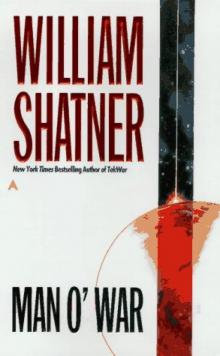 Man O' War
Man O' War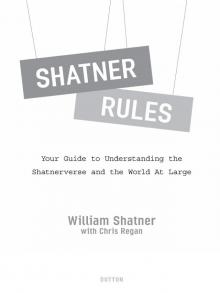 Shatner Rules
Shatner Rules Leonard
Leonard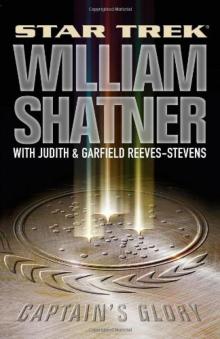 Captain's Glory
Captain's Glory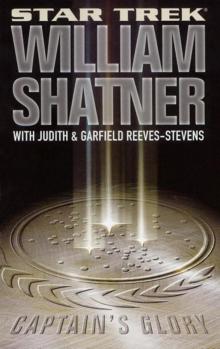 Captain's Glory зпвш-9
Captain's Glory зпвш-9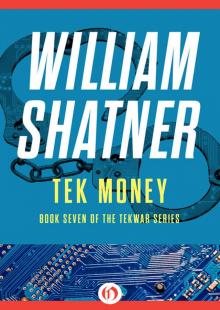 Tek Money
Tek Money Spirit of the Horse
Spirit of the Horse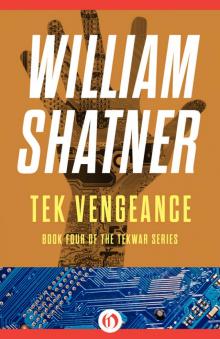 Tek Vengeance
Tek Vengeance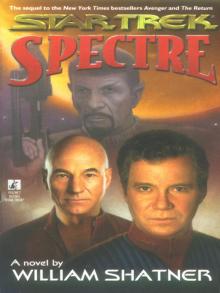 Spectre
Spectre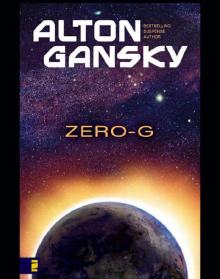 Zero-G
Zero-G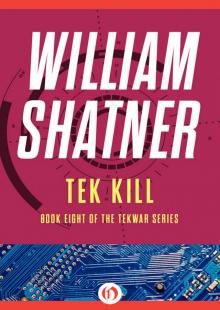 Tek Kill
Tek Kill Collision Course
Collision Course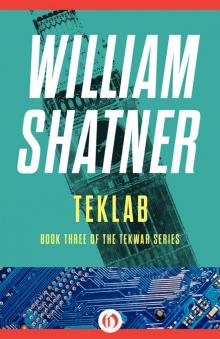 TekLab
TekLab Up Till Now
Up Till Now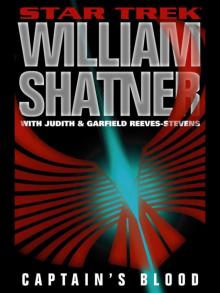 Captain's Blood
Captain's Blood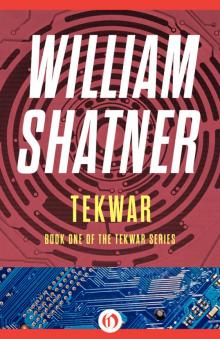 TekWar
TekWar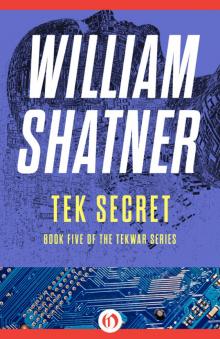 Tek Secret
Tek Secret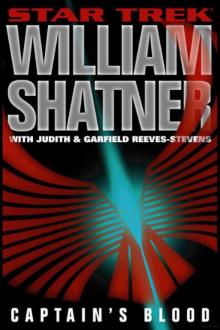 Captain's Blood зпвш-8
Captain's Blood зпвш-8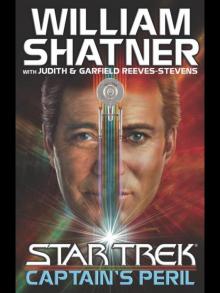 Captain's Peril
Captain's Peril Live Long and . . .
Live Long and . . .